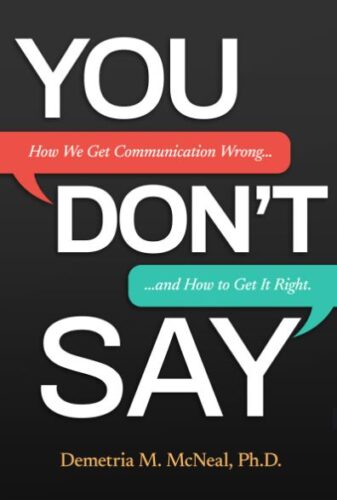by Carolyn Edlund
An interview with communications scientist Demetria McNeal on improving conversations and relationships.

Communications expert Demetria McNeal
Demetria McNeal has a background as a researcher, speaker, and communication coach. She has recently published a new book titled YOU DON’T SAY: How We Get Communication Wrong…and How to Get It Right which contains practical, hands-on strategies to help readers move from frustration and disappointment to joyful interaction. We recently spoke about an all-too-common problem: people in your professional and personal life who are simply hard to deal with.
AS: What constitutes a “difficult person”? Is it only our opinion when we clash with someone else? How can we gain insight and not be difficult ourselves?
DM: This is such a great question because most of us have encountered a “difficult” person. The issues that cause us to believe someone or a situation is difficult is about individual perspective, lived experience, and understanding the origins of the emotion attached to the person or situation. Which means, what may be a difficult person to one is not a difficult person to another.
Unfortunately, these three things affect how we interpret and deliver communication to others. Even more troubling is that sometimes we do not know the perspective, lived experience, and emotion of the other person. Thus we react to those unknown factors, which may create even more difficulties.
With that said, it is important to not let the other person infect your attitude. The only person we can control is ourselves. So, when we encounter these types of people or situations, we can ask ourselves these questions to gain insight into what is really happening:
- What about this person or situation makes it difficult?
- What are my emotions and feelings, where are they coming from, and are they warranted?
- Does this person find me to be difficult as well?
- What might I do or say to not be perceived as difficult in the moment?

AS: What strategies can an artist in business employ to handle difficult or unreasonable customers?
DM: “Difficult” and “unreasonable” can be very subjective. They can derail most interactions, as these judgements can instigate defensive emotional response. Therefore, it is nice to align with an objective point to allay concerns and minimize emotions. One way to do that is to identify goals. Believe it or not, both the artist and customer have goals and it is through identifying, understanding, and then meeting those goals that allows us to reach common ground. Some simple strategies an artist can use to handle customers are:
- Identify the problem as the customer views it. This does not mean you have to agree with the customer. Just seek understanding.
- Repeat back to the customer how you understand the problem to be from what was told to you. An example response might be, “Based on what you said, I understand your issue to be…. Is that right?”
- Ask clarifying questions, if necessary. An example question might be, “So you want to get…., Is that right?”
- Offer a solution and confirm if it is satisfactory for the customer. An example might be, “If I am able to…would that satisfy you?”
AS: Sometimes difficult people are in an artist’s family or perhaps a friend who does not believe in or support the artist’s choice of career. What is your advice for navigating these relationships?
DM: I have two responses, one for the artist and one for the family and friends of artists.
For the artist: As a creative, you may be misunderstood, not supported, and even misjudged (for example being labeled as “lazy”) while working in your craft. You have to believe in yourself regardless of what anyone else thinks, says, or insinuates. This includes the way you think about yourself and what you say to yourself. You believe what you say to yourself more than you believe what others say about you. I mention this because a part of believing in yourself is communicating that belief to others.
When others make snide remarks or say things that you perceive to be hurtful, it’s important for you to be clear in communicating that you are talented and that you are working in your gift. Confidence is contagious. If others are reminded of your talent and career choice, they will soon have to reflect on themselves and how they perceive your talent.
Note that if someone believes they can voice a lack of support openly and possible in front of others, they may continue to do so. In other words, there is an environment that allows them to feel they can do that, and you have to change the environment.
For family/friends of the artist: Someone else’s career choice is just that—their career choice. It is always helpful to show support and provide encouragement. However, if you do not agree with a friend or family member’s career choice, it may be best to keep it to yourself.
Voicing unsolicited comments shrouded as “advice” can create division, separation and estrangement. You see, sometimes the person has to be more important than the situation or circumstance. If you love the person, keep doing that, and leave out the commentary. As you can imagine, your friend or loved one may have had to deal with a great deal of rejection. As an artist, to suffer with the same sentiment coming from family and/or friends can be particularly crushing.
It might be helpful for you to seek to understand why you do not believe in or support your friend or family member’s choice of career. Self-reflection around the root cause of your attitude and feelings may give insight into why you feel the way that you do.



Speak Your Mind